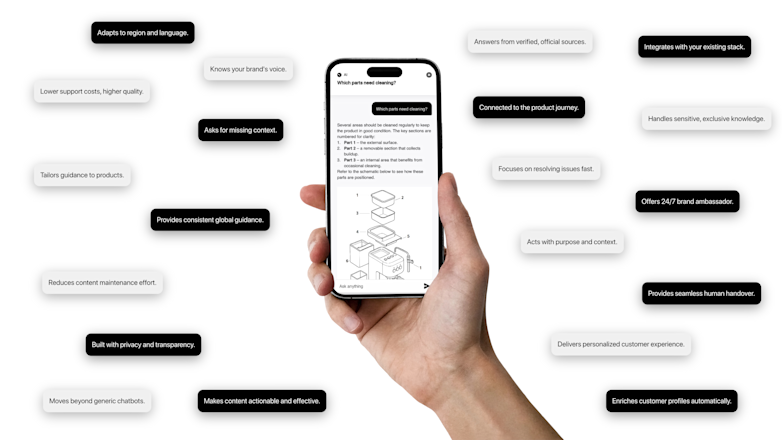
Data helps you monitor and improve business processes so you can save resources, both in terms of money and time. Precise and accurate data onboarding doesn’t require gathering large volumes of data, rather it focuses on extracting essential data points and obtaining meaningful insights required for making informed business decisions.
Businesses thrive more on sustainable sales than one-off sales. In marketing, there is a 60% to 70% chance of selling to an existing customer when compared to the 5% chance of closing sales with a new customer. As such, data collection has become a key activity companies should carry out to succeed in the market.
Collecting relevant data about your customers allows companies to improve the customer experience. When you know your customers you can engage with them on a deeper level and personalize their experience with your products.
On top of that, identifying the target customer will also allow companies to create tailor-made marketing campaigns that address that specific group of people interested in the products or services they are offering.
Customer data collection: a definition
Customer data collection is the process of gathering data about your users from a variety of relevant sources. This process helps companies understand their target customers to better satisfy their needs and wishes.
Thanks to customer data, companies can personalize the user experience and increase overall customer satisfaction. When customers are happy with what your brand is offering, they are more likely to stay and repeat purchases. Increasing customer retention should be the main focus of all businesses, and data collection excellently serves this purpose.
According to a recent survey, 44% of companies focus on customer acquisition, while in stark contrast only 18% focus on customer retention. Collecting data about your customers isn’t only about getting conversions, it mostly helps in retaining these conversions into long-term relations.
Why is it important to collect data about your customers?
Data has proven to be the lifeblood of every business nowadays. Collecting data about your customers specifically is fundamental to being successful in the market. Without knowing who your customers are and what your customers need you will never be able to offer them a value proposition and beat competitors.
Let’s quickly outline why data collection is important in the following bullet points.
Data helps businesses to gain a deeper understanding of their market. This information helps businesses to adjust and fit into their customers' needs. As a business, when you have a deeper understanding of the consumer, you can nip your product and service in a way that suits their desire, address their needs and help them overcome their challenges.
Data helps businesses to better personalize the customer experience. According to a survey by The Harris Poll, about 63% of consumers prefer personalized messages. Marketing strategies like personalized SMS campaigns have proven to be highly effective because customers feel valued by the company.
Customer data collection can help businesses make informed decisions whether their goals are related to product/service development, sales, or marketing. This data is vital in understanding what customers want. It will enable you to plan your effort across different areas and toward specific customer segments. Data collection helps businesses to save resources and make smarter decisions quickly even when they are operating in competitive and fast-paced markets.
Data helps to improve a company’s consumer database: a rich database is like a goldmine for any business. When you gain contact information about your customers you can reach out to them whenever you want. This means you can send them discounts, reminders, and new product announcements and constantly keep in touch with them. On top of that, if you manage to collect data about your potential customers, you can improve your lead generation strategy.
Four effective Ways of collecting first-party data during the On-boarding process
Firms can register valuable data regarding customers and the products they purchased during the onboarding process. Once customers purchase a product or a service, they are interested in learning how to use it most effectively. Companies can leverage this need to gather data about their customers.
The opportunity lies in the engagement of the product owners during the onboarding stage when they are interested in knowing more about the product. This is the right moment to ask customers to register and get relevant and useful additional data about them. This opportunity can be utilized to harness product preferences, interests, as well as personal information such as phone numbers and email that can be then used for marketing purposes later on.

Thanks to the data companies can gather during the onboarding process, it is possible to personalize the customer experience to increase satisfaction. In fact, based on the preferences expressed by users, you can personalize the interface (display information in the preferred language) and send them specific reminders and discounts based on their interests.
On top of that, gathering content information about your customers can be useful to leverage up-selling and cross-selling opportunities. In other words, you can update your customers in real-time about special offers and new product releases that can be interesting for the product they have purchased.
Now that we have understood how significant it is to collect data during the onboarding stage, we shall look into how we can get this information. __There are several ways to harness the power of data during the onboarding stage, which one to use depends on the company’s specific needs a__nd preferences.
1. Request Customer Data
At the onboarding stage, brands can request customers to register their products to get additional instructional content or special discounts. You can ask customers to fill out a form containing personal information such as name, email, phone number, and so forth.
2. Marketing Survey
During the onboarding process, you can also ask customers to fill out a survey about their preferences and interests. Carrying a survey is a reliable way of collecting customer data. Businesses create marketing surveys to research customer needs, interests, and potential challenges.
In surveys, customers can be asked to fill in basic information as well, such as name, surname, email, and phone number. These surveys will also help brands make specific adjustments to their products tailored toward addressing those needs.
3. E-mail Subscription
E-mail marketing remains one of the most effective marketing strategies to date. Through a newsletter, brands can share with customers regular tips, promotions, and new offers. During the product registration, customers can be asked to enter their email addresses if they want to subscribe to the newsletter.
4. Use of Analytical Tools
Google Analytics, Zoho, and Kissmetrics are Customer Relation Service tools that can effectively track customer behavior. These tools can help you keep track of customers’ behaviors during the onboarding process.
How can Layerise help you collect data during the onboarding process?
It is now clear that the onboarding stage is a good moment to collect data about customers. Collecting data is useful to personalize the user experience and improve your marketing efforts. Also, being able to directly communicate with your customers through text messages or email is a powerful way to retain them and give them incentives to repurchase from you.
Layerise provides the most seamless data onboarding experience for your customers. It allows you to collect relevant data about your customers during the registration process. Thanks to these pieces of information the customer discloses, Layerise automatically personalizes the experience for your customers.
Thanks to the data collected during the registration phase, Layerise also makes it easier for your agents to provide support to customers. In fact, when using the Layerise chat feature, your representatives won’t need to search for specific customer information because all this data will be automatically displayed for you.
On top of that, with Layerise you can build automated marketing campaigns according to your target audience based on all the information you collected during the onboarding process. You can make your send-outs personal and relevant to boost conversions.
To learn more about how Layerise can help your business, book a free demo now!
Learn how to collect valuable insights on your customers to sell even more.

How to Turn a New Obligation into a Growth with Layerise

A trusted, brand-safe AI assistant that knows your products, your customers and your content.


